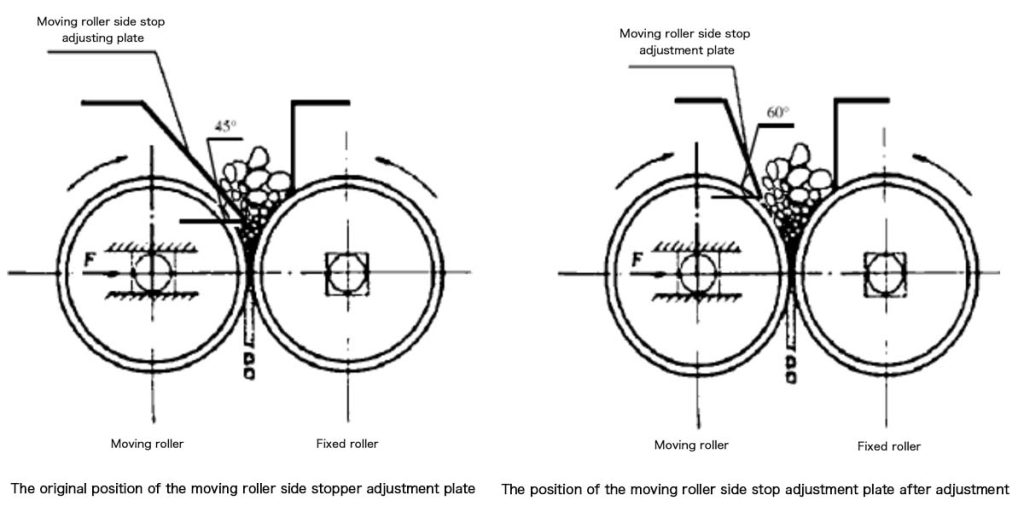Since the commissioning in May 2007, Company A’s cement pre-grinding system has faced frequent failures with the roll press. These issues include low and unstable working pressure on both sides, improper adjustment of the material distribution valve, large particle size of the material exiting the roll press, low hourly output, high grinding energy consumption, and poor overall economic efficiency. This article will share our experiences and improvement measures in controlling the roll press.
Problem 1: Uneven Material Distribution Causing Pressure Fluctuations
Root Cause:
Material guide plate misalignment (45° angle toward fixed roller)
80% material flow biased to fixed roller side
Moving roller side starvation → pressure instability

Solution:
Repositioned guide plate to 60° angle facing moving roller exterior
Set initial roller gap to 10mm for optimal material bed formation
Result: Balanced flow distribution → pressure stabilized within 72 hours
Problem 2: Low Hydraulic Pressure (6.0MPa vs Required 8.2MPa)
Diagnosis:
Initial system pressure set at 6.0MPa (below threshold)
Hydraulic pumps couldn’t compensate for roller gap expansion
Fix:
Increased initial pressure to 6.5MPa
Stabilized feed rate at 220±5 t/h
Outcome:
Working pressure reached 8.2-8.6MPa
Crushing ratio improved from 4.09 to 10.10
Data Spotlight:
| Parameter | Before | After | Change |
|---|---|---|---|
| Working Pressure | 7.4MPa | 8.6MPa | +16.2% |
| Power Draw | 42kW | 35kW | -16.6% |
Problem 3: Material Distribution Valve Misconfiguration
Mistake:
Valve opening set at 20% → edge material buildup
Coarse particles (~10mm) in finished product
Correction:
Adjusted valve opening to 23%
Cleared edge chutes every 4 hours
Verification:
No more material accumulation
Particle size distribution:
5mm: 0% (previously 12%)
<2mm: 89% (previously 63%)
Before/After Performance Comparison
| KPI | Pre-Fix | Post-Fix | Improvement |
|---|---|---|---|
| Avg. Particle Size | 3.81mm | 1.54mm | 59.6% |
| System Output | 100% | 113.1% | +13.1% |
| Energy Consumption | 100% | 83.4% | 16.6% |
Why These Solutions Work
1.Mechanical Advantage
60° guide plate angle optimizes material trajectory
6.5MPa initial pressure builds sufficient hydraulic force
2.Process Synergy
Valve opening at 23% balances throughput & grinding efficiency
Regular edge chute cleaning prevents recirculation
Maintenance Pro Tips
🔧 Monthly Checks:
Laser-align roller parallelism (tolerance <0.1mm/m)
Test hydraulic accumulator precharge pressure
⚠️ Red Flags:
Pressure fluctuations >±0.3MPa → Check feed consistency
Sudden power spikes → Inspect bearing lubrication
Key Improvements Achieved
✅ +13.1% hourly output – Ball mill production increase
✅ 59.6% finer particles – Avg. size reduced from 3.81mm to 1.54mm
✅ 16.6% energy savings – Lower grinding power consumption
✅ Stable 8.6MPa pressure – Up from fluctuating 7.4-7.8MPa
If you face similar issues, please feel free to contact us. We are happy to help!

